No Longer Just for Sleeping, Illinois Residence Halls Provide Learning Via LLCs
November 13, 2015
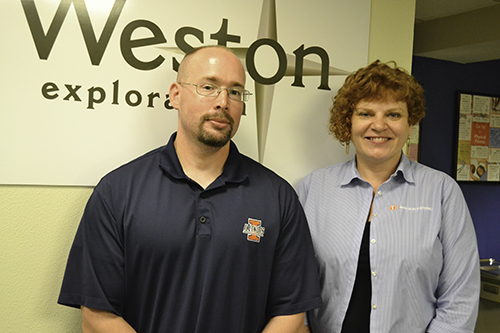
Left to right: Nathan Sanden, Assistant Director of Residential Life, and Alma Sealine, Director of University Housing
It’s not your mother’s dorm any more. In fact, according to Alma Sealine, Director of University Housing, and Nathan Sanden, Assistant Director of Residential Life, in the university housing world, dorm is a four-letter word—and not just because of the number of letters it has.
“The 4-letter word dorm means that you only eat and sleep in that location,” explains Sealine, “whereas we like the terminology residence hall because it accounts for the living and learning that occurs, in addition to just sleeping there.” Thus, the name Living-Learning Communities, or LLCs.
What sets LLCs apart is their specific academic or theme focus based on student interests. For instance, just as their names imply, WIMSE (Women in Math, Science, and Engineering) is specifically for women in STEM majors; Health Professions is for students pursuing careers in health professions. For other communities, it’s based on a theme; LEADS’ theme, for example, is leadership.
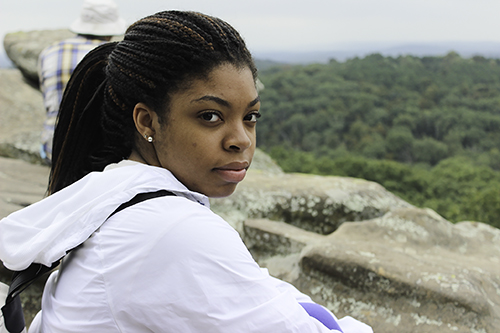
A member of the Sustainability LLC, Asha Simmons, during the field trip to Dixon Springs as part of the ESE 298 course (photo courtesy of Jennifer Bechtel).
“LLC’s allow that programming to be more focused to what the students have told us are their interests based on living in that community,” says Sanden. “With WIMSE for example, we’re able to bring in faculty and speakers who can speak specifically on women in STEM fields…and provide opportunity for students to do research specifically in those fields...It allows some of those more focused co-curricular opportunities for students.”
Illinois was one of the first schools in the country to start a living-learning community: Unit One in Allen Hall, way back in 1971. “There were a few schools doing it,” Sanden explains, “but we were right on the cutting edge of the movement.”
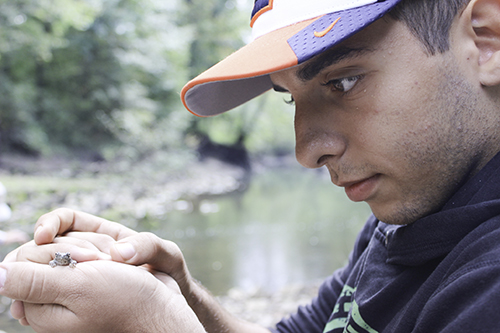
Vince Spagnola examines a tiny frog during the field trip to Dixon Springs as part of the ESE 298 course (photo courtesy of Jennifer Bechtel).
Sealine adds that LLCs became very popular in the 1990s. “That’s really when the big push started," she says, and housing professionals started "finding ways to connect to the educational mission of the institution.” But Illinois has always been seen as a leader in this area because by the 90s, Unit One had already been around for 20 years.
“It continues to be a focus of how you highlight the education that happens in a residential area,” says Sealine, adding that Illinois’ definition of an LLC is that it’s attached or aligned with an academic unit, while other campus’ definitions might be different.
Illinois currently has nine LLCs; they’re listed below, along with the year each was begun, and its academic or thematic emphasis. (Honors LLC will begin in 2016, upping the number to ten. (As an aside, Sanden says there was to be a Unit Two, a Unit Three, and so on, but the naming protocol didn’t take.)
- Unit One at Allen Hall (1971) – began with requests from Art & Design and several other academic departments
- Weston Exploration (1997) – designed for students who are either undeclared or declared but still considering other majors. Works with General Studies Division.
- LEADS (1999) – focuses on leadership education and service. It features an Introduction to Leadership course (AG ED 260) and a leadership seminar series. LEADS is intentionally kept very broad, not designed for any specific major.
- Global Crossroads (2000) – focuses on cross-cultural communication and understanding from a global perspective. It’s 50% domestic and 50% international students. Begun by a variety of academic departments, study-abroad office, and student affairs departments.
- Intersections (2004) – parallel to Global Crossroads, it focuses on cross-cultural communication and understanding from a U.S. perspective.
- Health Professions (2007) – for students exploring health majors.
- Innovation (2010) – which focuses on entrepreneurship and innovation, started in 2010.
- WIMSE (Women in Math, Science, and Engineering) is for women in STEM careers.
- Sustainability (2012) – The newest one LLC, partners with School of Earth, Society, and Environment and also with NRES, and the Student Sustainability Committee.
- Honors LLC (2016) – this multidisciplinary LLC will work primarily with James Scholars and honors students.
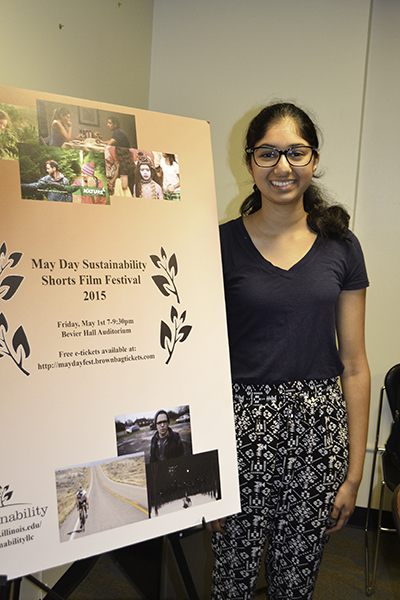
Sohinee Oswal, a member of both the Innovation and Sustainability LLCs.
What are some benefits of participating in an LLC? “Courses that are taught in the residence halls that count, that are part of the curriculum for that particular living-learning community,” Sealine explains. So when it’s five degrees below 0 in the middle of a blizzard (and everyone knows Illinois never closes, despite the weather), students don’t have to suit up and trudge across campus through snow drifts, but can just head to the LLC classroom in their residence hall.
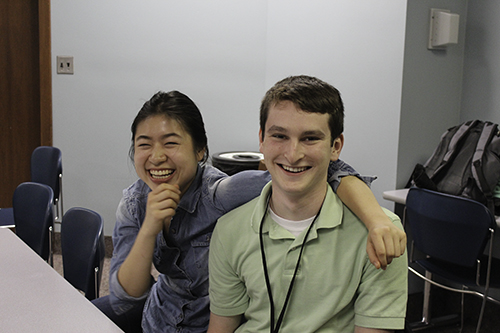
Innovation LLC RAs Melissa Wu and Matt Jones (photo courtesy of Jennifer Bechtel).
In addition to the convenience of a classroom that’s in close proximity, the courses are high quality. “They’re intentionally small,” boasts Sanden. “Most of our LLC courses are 20 students or fewer.” He says that even large GenEd courses held in auditoriums might have a smaller section in an LLC, which allows students “to have much more contact with faculty and instructors that they would outside of the LLC.”
In addition, while some LLC courses might be smaller discussion sections of larger lecture courses, some are unique to the LLC, and not offered anyplace else.
“I think it makes the largeness of U of I small,” explains Sealine, “and it provides opportunities for individuals to really intersect and interact with individuals one on one. They may not have that opportunity in a large lecture hall but if they can take advantage of those courses in the LLC communities, then they have a more intimate interaction with the faculty and also an understanding of the curriculum.”
Sanden agrees that LLCs allow students to meet and get to know faculty better. And faculty who agree to teach an LLC are encouraged to provide co-curricular opportunities in addition to just teaching a course.
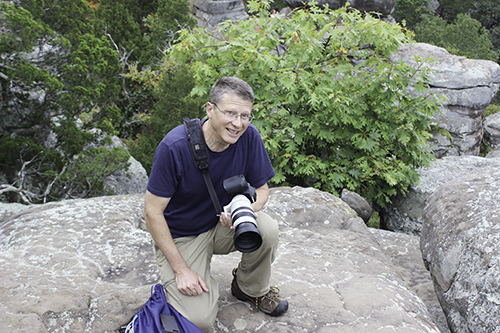
Robert Kanter, instructor of the Sustainability LLC's ESE 298 course (photo courtesy of Jennifer Bechtel).
“The fact that they teach within LLCs, they have an understanding that they’ll be doing a little more than just teaching. So the leadership course, for example, they might present other workshops to the students so the students get to know them outside of the classroom as well, which is a really important thing for students.”
While the activities are sometimes co-curricular, specifically tied to the course, sometimes they’re purely extra-curricular. “We have faculty who will have some of the students in their courses over at their house, for example, to just have fun and have a meal or something so they get to know faculty on a more personal basis as well.”
Do certain faculty see a real benefit in being more engaged with the students and, thus, get involved with LLCs?
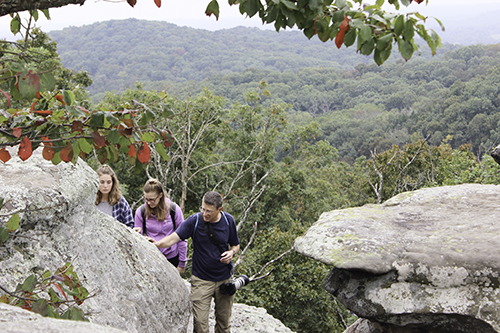
ESE 298 instructor Robert Kanter (right) points out lichen on a rock formation to Sustainability LLC students AnnaMae Dziallo (left) and Kealie Vogel during a field trip to Dixon Springs(photo courtesy of Jennifer Bechtel).
“Yes,” acknowledges Sanden, “and those are the faculty we look for! We have a lot of faculty who have been teaching with us for years and they very much enjoy it. They get that contact with students that they may not otherwise have.”
Sealine describes LLC faculty as “individuals who are willing to work outside of classroom hours. So they invest time in the early evenings to go to events in addition to the classes that they teach in that particular LLC. They make themselves available for additional hours on certain days.” She indicates that faculty might engage in different ways, “but successful faculty members see their role with LLCs as being more than just teaching a class.”
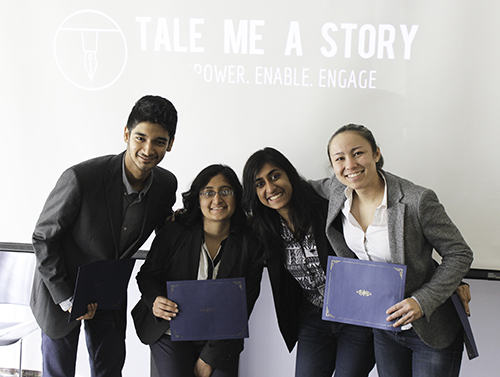
Innovation LLC students who participated in the Fall 2015 Extreme Entrepreneurial Lock-in (photo courtesy of Matt Jones).
In fact, when the program is looking to start a new course, they explain the history of LLCs, what they’re about, the kind of faculty needed, and “the academic departments know what we’re looking for,” and get back to them with the names of interested faculty.
Sanden explains that LLCs also allow students to get to know other students with like interests: “When you live in a living-learning community, you know there’s at least one thing you’re going to have in common with them, whether it’s the major or the theme of the community…For first-year students, it helps them transition to the university a little more easily when they have individuals around them who at least have some similar interests to them.”
This transition for new students component is important, because LLCs are comprised of about 70–75% freshmen and 25–30% returning students. Sanden qualifies that percentages vary by community. He says Unit One at Allen Hall tends to be around 50/50 in terms of freshmen and returners. Innovation is usually made up of a higher percentage of returning students. Weston, which is designed for students who are either undeclared or considering switching majors, tends to be 90–95% freshmen, “because it’s designed to be a 1-year program while they’re exploring."
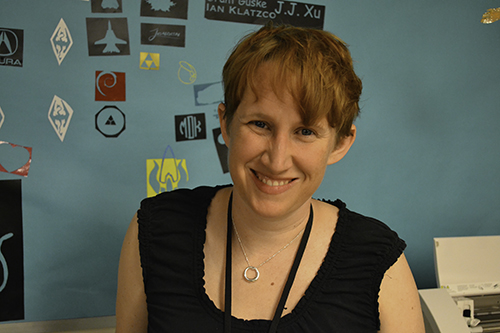
Jennifer Bechtel, Program Director for the Innovation and Sustainability LLCs.
Sanden’s role is to provide overall direction for the LLC program and to supervise the four current program directors. He explains that the position of program director “appeals to individuals who have high academic training but also very much want to focus on students and meet and work individually with students.” The position doesn’t exist in a lot of places, is especially appealing to people who are “passionate about working with students specifically around academics but within a residential setting.”
Sealine’s role is to advocate for LLCs at the campus, national, and international levels; gather information to help keep University Housing current; and to ensure that their programs provide the best experience for their students.
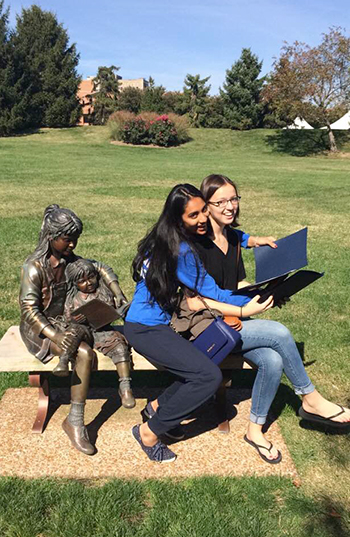 Ashley Maras and Soumya Yallapragada, members of the Health Professions LLC, on a trip to St. Louis (to learn about career and learning opportunities in the St. Louis area (photo courtesy of Lydia Khuri).
Ashley Maras and Soumya Yallapragada, members of the Health Professions LLC, on a trip to St. Louis (to learn about career and learning opportunities in the St. Louis area (photo courtesy of Lydia Khuri).What do the two find particularly satisfying about their jobs? Sealine finds the great reputation that Illinois residence hall programs have to be extremely gratifying: “No matter where I go, there’s always someone that says, “You have an LLC at the University of Illinois; I want to talk to you about that!”
Sanden says his favorite part of the job is the students: “I get to work with brilliant, creative students all the time, and that’s what makes it worth all the frustration." He explains that, like any job, it can be frustrating, "but all that goes away when I go to Innovation, for example, and I see a ground-breaking project one of our student teams is working on where they’re designing a water system that will help feed third world countries. So all that other stuff stops being important.”
“That really is what gets up me in the morning,” adds Sanden, “seeing what our students are going to do next. We have projects, things that even at my age I would have never thought of. I mean, just the creativity and the brilliance of our students at U of I, honestly, is what gets me up in the morning.”
Then he goes on to boast that several LLC students have even started their own companies. For instance, he reports that the person who started Miss Possible lived in two LLCs and was an RA in Innovation.
The two are continually striving to improve their programs. For instance, to ensure that their LLCs are meeting students’ needs, they conduct a different survey for each community based on what happens there. “We ask a variety of questions about their satisfaction but also what they are learning from living in the LLC,” Sanden explains. They also do focus groups, inviting students to come and talk to them about the courses or whether certain programs are still meeting students’ needs, how they can be improved, or if they should be eliminated.
 Left to right: Annamae Dziallo, Peter Regan, & Isaak Haberman (photo courtesy of Jennifer Bechtel).
Left to right: Annamae Dziallo, Peter Regan, & Isaak Haberman (photo courtesy of Jennifer Bechtel).Sealine admits, “We all try to think strategically about next steps and what’s in the future for LLCs. They have been very successful here, and we want to continue to provide that for students in the future.”
Sealine stresses the importance of their partnerships with the academic units: “In order for us to be successful in the future, we have to continue to find ways to connect with our academic partners. It’s not just a one-time connection but it’s a long-term connection and to focus on the word ‘partner.’ We really do work to have great partnerships with our faculty and that’s what we want to continue to try to do.”
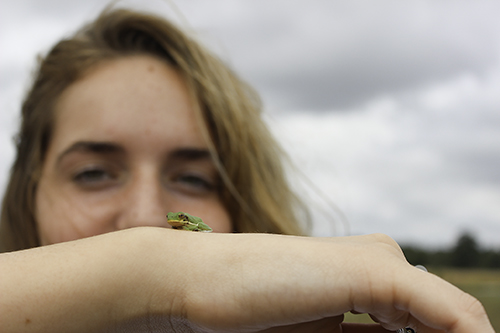 Rachel Carey illustrates a miniature frog during ESE 298's field trip to Dixon Springs State Park to observe the flora, fauna, and rock formations (photo courtesy of Jennifer Bechtel).
Rachel Carey illustrates a miniature frog during ESE 298's field trip to Dixon Springs State Park to observe the flora, fauna, and rock formations (photo courtesy of Jennifer Bechtel).While LLCs seem new and cutting-edge, Sanden explains that they are actually a very old notion:
“They really harken back to the Cambridge Model for higher education. If you think of when colleges in England and elsewhere started, faculty and students lived together. That was the whole idea, it was designed to be learning all the time and we kind of got away from that a little bit in this country and LLCs were one way to bring that back.” While faculty and students don’t actually live together, he admits that “This is the closest we can get to that increased interaction with faculty and students.”
Author/Photographer: Elizabeth Innes, Communications Specialist, I-STEM Education Initiative
Special thanks to Jennifer Bechtel, Program Director for the Sustainability and Innovation LLCs, for her amazing photographs of the Dixon Springs field trip.
For more related stories, see: Undergrad, Undergraduate Education Reform, 2015
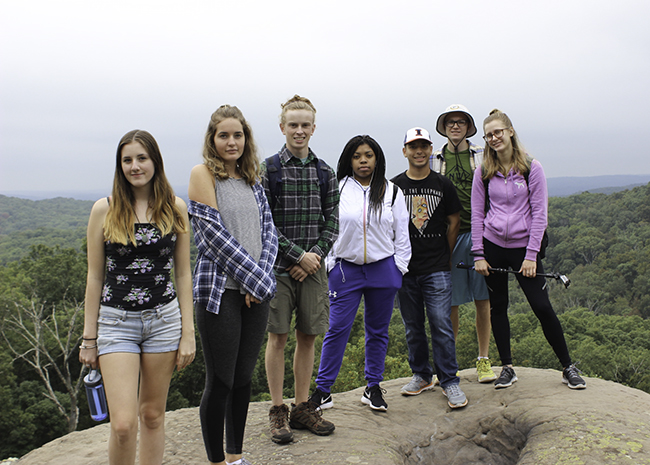
Left to right: Sustainability LLC students Annamae Dziallo, Rachel Carey, Peter Regan, Asha Simmons, Vince Spagnola, Isaak Haberman, Kealie Vogel on the field trip to Dixon Springs State Park (photo courtesy of Jennifer Bechtel).
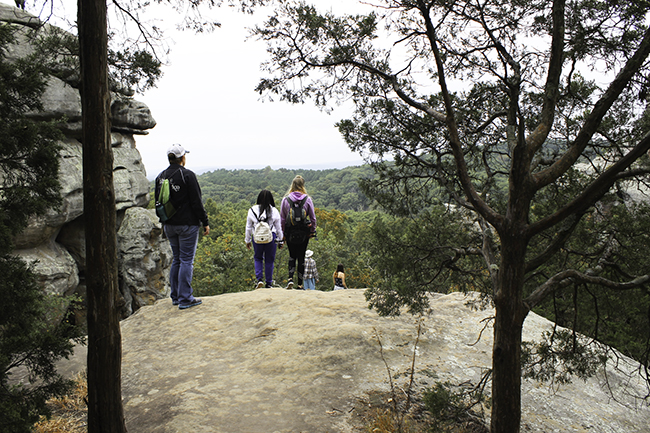
Students in the Sustainability LLC's ESE 298 course enjoy the view (photo courtesy of Jennifer Bechtel).













.jpg)
















